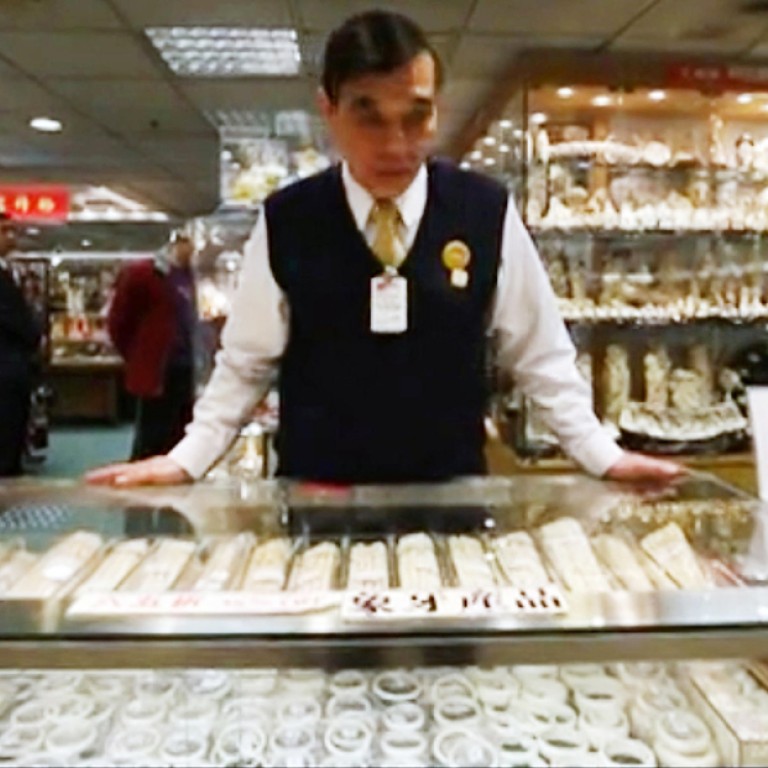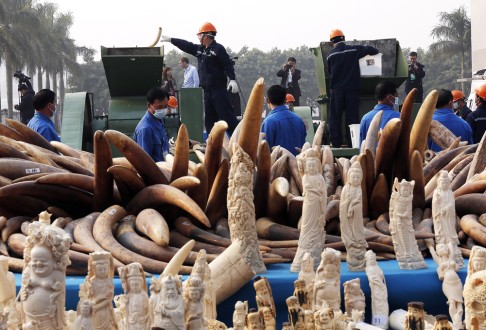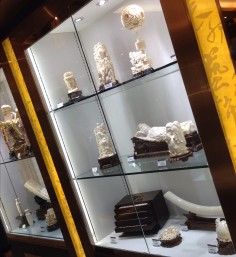
Hong Kong craft shop staff secretly filmed advising customers how to smuggle ivory across border
Sales assistants in major shops filmed telling undercover reporters how to illegally take elephant tusk products through customs
Employees at two established craft stores in Hong Kong advised undercover reporters on how to illegally smuggle ivory across borders, according to a British news report.
Raw video footage shared with the South China Morning Post shows employees of Chinese Arts and Crafts in Admiralty and Yue Hwa on Nathan Road telling the British TV reporters, who posed as customers, how to avoid customs when smuggling ivory across borders.
Ivory is “easy to take out, even if you go through the metal [detector], there’s no sign. You [just] hide it somewhere”, one elderly salesman at Yue Hwa told the reporters from broadcaster ITN. “Still, according to the book, it is illegal.”
Watch: Video of undercover journalists given tips on how to smuggle ivory out of Hong Kong
While the undeclared import and export of ivory is illegal in Hong Kong, trade remains legal and registered dealers can export ivory dating to before a global ban was imposed in 1989.
Selling ivory to customers who plan to illegally take it abroad goes against company policy, an employee of Chinese Arts and Crafts (HK) Limited told the Post in a reaction to the report. Sales staff were instructed to inform customers that they could not export ivory, the company said in a statement.
The chain of four stores is a subsidiary of Hong Kong-listed China Resources Enterprise, which takes “all accountable and practicable measures to minimise the impacts that our business operations may have on the environment” according to its latest corporate social responsibility report.

The company’s invoices include a warning that ivory “usually cannot be brought into and out of Hong Kong”, he said. The chain operates 18 stores in Hong Kong and 3 in Singapore, according to its website.
Activists say the city has become a key transit point for the illicit trade from Africa to China.
By the end of last year, the Agriculture, Fisheries and Conservation Department held 29.6 tonnes of seized ivory stemming from more than 10,000 elephants. It plans to destroy the majority of its stockpile in the near future in an effort to dissuade future trade.
The value of 1kg of ivory ranges from HK$8,000 to HK$15,000.
A senior sales consultant at Chinese Arts and Crafts told the ITN reporters about a customer who bought two dozen chopsticks made of ivory and smuggled them to Singapore, hidden among four dozen plastic chopsticks. “Two or three weeks later, she came back and wanted to buy more,” he said, in the video footage dated from Monday.

The salesperson also spoke of customers smuggling ivory in socks to North America, and about how others avoid checks on the mainland side of the Shenzhen border by leveraging their contacts at customs there. “[It] depends on the class of your friends,” the salesman said.
Referring to “blood ivory” chopsticks, made from tusks from freshly killed elephants, he was candid about the questionable ethics of his trade. “You will think this is very cruel,” he said, “but when you use it, [you will see that] this has much more value.” The chopsticks’ quality was superior to those made of tusks taken from elephants that have been dead for some time, he explained.
On Wednesday, sales staff at Chinese Arts and Crafts were hesitant to sell ivory. “If you want to export it, you can choose a mammoth,” a salesperson told the Post, referring to a poster of the mammoth that can be seen inside the shop. “No matter how small, it is still illegal to bring ivory across the border,” she said.
A spokesperson for Chinese Arts and Crafts (HK) Ltd. told the Post: “As many customers may ask about the export of ivory and we would definitely insist that ‘no import or export is allowed and all transactions must be carried out in compliance with applicable laws'.
"In view of the above, Chinese Arts & Crafts (H.K.) Ltd. will look into the case and would remind our sales force of the company policy and strengthen training and monitoring in order to prevent causing misunderstanding to our honourable customers when selling ivory carving and Mammoth carving products."
In a joint statement, two Hong Kong conservation groups – the ACE Foundation and WildLifeRisk – said the video clips show that businesses in the city are actively undermining conservation efforts for commercial gain.
“The surfaced footage shows sales staff heavily promoting ‘blood ivory’ products,” the statement read. The groups call on the SAR government to enact a permanent ban on ivory sales.
The global ban on ivory trade has been suspended just twice so far in one-off sales, in 1999 and 2008. These have spurred demand for ivory among affluent Chinese, a group of 22 wildlife advocacy groups said in a statement on Tuesday, calling for a comprehensive ban on the trade.
On Tuesday, the US revised its regulations on ivory, allowing ownership and gift giving, but banning commercial sales.
Delegates from 50 countries have gathered in London for a conference this week to discuss ways to stop the poaching of endangered animals.
African forest elephants could go extinct within a decade, according to study by 60 scientists released last year. Over the past 10 years, the population has decreased by 62 per cent, the study estimated.
Additional reporting by Amy Nip.
Watch: Prince Charles defeats poaching in Chinese

